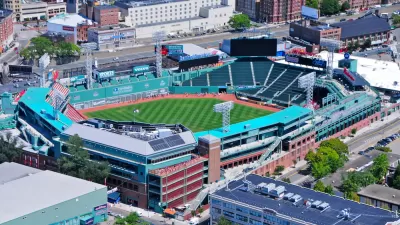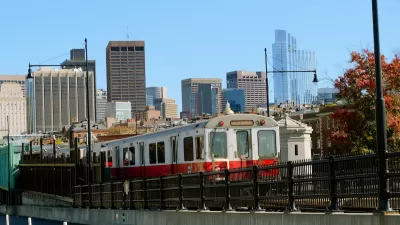Anthony Flint reflects on the story of economic development and historic preservation that led to the saving of Boston's historic Fenway Park from demolition in the 1990s.
Flint discusses the confluence of factors (aging infrastructure, need for more seats and revenue) leading to calls for the historic treasure's demolition, various plans for replacements, and the heroic effort to save the ballpark.
"Today Fenway Park has the Monster Seats and hand-crafted ales and delicious clam chowder, expanded and more comfortable seating all around, the ubiquitous luxury boxes uniquely close to the action. Watching a game at Fenway Park is an experience unlike any other."
However, there's a downside to this treasured experience, its "increasingly out of reach for middle-class families."
"It's hard to say how much the cost of all the renovations and improvements at a 100-year-old facility factors into this – the major cost being the payroll for the players – and harder still to imagine that a brand new ballpark wouldn't trigger this same kind of impact on fans. But historic preservation is always costly."
For most Bostonians, I'm guessing, the price to preserve this unique historical experience is plenty worth it.
FULL STORY: As Fenway Park Turns 100, Remember That It Almost Didn't Make It

Maui's Vacation Rental Debate Turns Ugly
Verbal attacks, misinformation campaigns and fistfights plague a high-stakes debate to convert thousands of vacation rentals into long-term housing.

Planetizen Federal Action Tracker
A weekly monitor of how Trump’s orders and actions are impacting planners and planning in America.

San Francisco Suspends Traffic Calming Amidst Record Deaths
Citing “a challenging fiscal landscape,” the city will cease the program on the heels of 42 traffic deaths, including 24 pedestrians.

Defunct Pittsburgh Power Plant to Become Residential Tower
A decommissioned steam heat plant will be redeveloped into almost 100 affordable housing units.

Trump Prompts Restructuring of Transportation Research Board in “Unprecedented Overreach”
The TRB has eliminated more than half of its committees including those focused on climate, equity, and cities.

Amtrak Rolls Out New Orleans to Alabama “Mardi Gras” Train
The new service will operate morning and evening departures between Mobile and New Orleans.
Urban Design for Planners 1: Software Tools
This six-course series explores essential urban design concepts using open source software and equips planners with the tools they need to participate fully in the urban design process.
Planning for Universal Design
Learn the tools for implementing Universal Design in planning regulations.
Heyer Gruel & Associates PA
JM Goldson LLC
Custer County Colorado
City of Camden Redevelopment Agency
City of Astoria
Transportation Research & Education Center (TREC) at Portland State University
Jefferson Parish Government
Camden Redevelopment Agency
City of Claremont





























